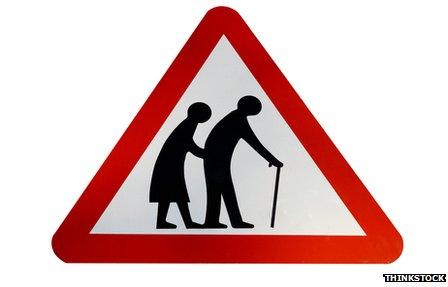Older workers create extra jobs for young people - report
- Published

Twiggy - who is still working at the age of 65 - has leant her support to the campaign for older workers
When people in their 50s stay on in the workforce, it creates more, not fewer, jobs for younger people - according to a government-backed report.
Keeping older people at work can also boost wages for younger employees, argues Ros Altmann, the government-appointed champion for older workers.
Her report suggests that extending working lives would add £55bn a year to the UK economy.
If everyone worked one year longer, it would add 1% to annual GDP, she says.
"Academic and historical evidence shows that, far from damaging job prospects, keeping more older people in work is associated with rising employment and wages for younger people," said Dr Altmann, a former adviser to 10 Downing Street.
If older people keep working, the theory goes, they have more money to spend, and that boosts the economy, creating more jobs for everyone.
Conversely, if older people stop work, there is less money in the economy, so fewer jobs.
The idea is well-known to economists as the "lump of labour fallacy" - the false belief that the number of jobs in an economy is fixed.
Road signs
If the number of over-50s leaving the workforce continues at its present rate, the UK could suffer serious labour and skill shortages, says Dr Altmann.
By 2022 there will be 700,000 fewer people aged 16 to 49 in the UK - and immigration will not be able to make up for that loss, she argues.
Her report - A New Vision for Older Workers: Retain, Retrain, Recruit - also claims that there is "significant ageism" in the workplace, with staff facing barriers to promotion and training.

Signs like this should be banned, both by the media and the government, said Dr Altmann
Older women in particular face barriers to remaining at work.
She called on the government to:
appoint a national champion for older workers
introduce a national strategy to improve adults skills
tackle age discrimination by imposing new penalties
improve job centre programmes for over-50s.
Dr Altmann has also called on the media to use new images for old people.
She said there should be more older presenters on television, especially female presenters.
She specifically appealed to newspapers and websites to stop using road signs showing stooped-over people, when writing about those over 50.
She added that the government should also abandon the signs, as they feed in to negative subliminal perceptions of old age.
- Published13 June 2014

- Published9 March 2015
